What Resources Do You Need For An Organic Fraud Prevention Plan (OFPP)
Summary: If you grow, raise, process, package, or label organic products, you likely need organic certification. Only certified operations can legally sell, label, or represent products as “organic,” “100% organic,” or “made with organic ingredients.”
If you’re certified organic, you are now required to complete an Organic Fraud Prevention Plan (OFPP) as part of your Organic System Plan (OSP). This guide helps you complete the OTCO OFPP module and understand your responsibilities under the Strengthening Organic Enforcement (SOE) rule.
A free Organic Fraud Prevention Webinar is available to walk you through the process.
📄 Download the OFPP Guide and submit it to your OTCO client service team.
Who Needs Organic Certification?
Do I need organic certification?
Under the Organic Foods Production Act of 1990 (OFPA) and the USDA National Organic Program (NOP), businesses and farms that want to sell or label products as organic must be certified by a USDA-accredited certifier such as Oregon Tilth.
Certification protects organic integrity by ensuring all parts of the supply chain meet the same organic standards. Unless you qualify for a specific exemption, you must be certified if you are producing, processing, packaging, or handling products represented as organic.
Who must be certified organic?
The following activities generally require certification:
- Farming of crops, agricultural goods, and livestock feed
- Raising, selling, or auctioning livestock marketed as organic
- Processing agricultural products, personal care products, or fiber/textile goods using organic ingredients
- Packaging, re-packing, or labeling organic products or ingredients
If your business performs any of these activities, you must be certified before making organic claims.
Why certification matters
- Legal requirement: Only certified operations can use “organic” labeling under U.S. law.
- Consumer trust: Certification verifies compliance with strict production and handling standards.
- Market access: Retailers and international markets often require USDA-accredited certification.
Exemptions and exclusions
Some small operations and specific handlers may qualify for exemptions under NOP §205.101. For example, operations selling less than $5,000 in organic products annually are exempt from certification but must still follow the organic production and recordkeeping standards.
Technical details
- The Organic Foods Production Act (7 U.S.C. 6501 et seq.) requires that products labeled as “organic,” “100% organic,” or “made with organic ingredients” must come from certified organic operations.
- Certification applies to all parts of the organic supply chain, from production to final packaging.
- Businesses performing multiple activities (e.g., growing and processing) may need multiple certification scopes.
- Noncompliance with certification requirements can result in penalties, product removal from the market, or loss of certification.
What Is Organic Fraud?
Organic fraud is defined in §205.2 as:
“The deceptive representation, sale, or labeling of nonorganic agricultural products or ingredients as ‘100 percent organic,’ ‘organic,’ or ‘made with organic (specified ingredients or food group(s)).’”
What Does This Mean for Producers?
As of March 19, 2024, all certified and applying organic operations must:
- Assess their supply chains
- Identify critical control points (CCPs) where fraud may occur
- Develop strategies to prevent or mitigate fraud
- Implement monitoring procedures to evaluate those strategies
(a)(3) A description of the monitoring practices and procedures to be performed and maintained, including the frequency with which they will be performed, to verify that the plan is effectively implemented. This must include a description of the monitoring practices and procedures to verify suppliers in the supply chain and organic status of agricultural products received, and to prevent organic fraud, as appropriate to the certified operations activities, scope, and complexity;
These steps are documented in your OTCO OFPP module, a required part of your OSP.
Why Is Fraud Prevention Important?
Fraud prevention:
- Protects consumer trust in the organic label
- Preserves market integrity by deterring unfair competition
- Safeguards organic farmers and businesses
- Ensures compliance with U.S. and global organic standards
- Supports environmental sustainability by enforcing organic methods
What Needs to Be Included in an OFPP?
Your plan must include every certified organic item your operation purchases, such as:
- Crop operations: Organic seeds or seedlings
- Livestock operations: Organic feed, bedding, or animals
- Handling operations: All organic ingredients used in products or sales
📝 Do not include non-organic inputs like cleaners, pesticides, or fertilizers.
OFPP Structure
OTCO organizes the OFPP into five sections:

1. Organic Fraud Prevention Team
Designate a person or team responsible for:
- Maintaining and updating the plan
- Training relevant staff
- Monitoring implementation and effectiveness
2. Supply Chain Map & Critical Control Points (CCPs)
Map all organic items received, and include intermediary steps like transport or storage. Use simple flowcharts or spreadsheets.
Your map must:
- Group ingredient types (not individual suppliers)
- Identify CCPs where fraud risk exists (e.g., transport, brokers)
- Include domestic and international suppliers if applicable
⚡ Mark CCPs clearly (e.g., with a lightning bolt symbol).
In the examples below, the supply chain maps are simple flow charts. Supply chain maps do not have to include every individual supplier of every organic ingredient, but must include one listing for a particular ingredient group. If the system is more complex, the suppliers must be broken into smaller groupings.
Supply Chain Map examples by certification scope (Crop, Livestock and Handling):
CROP: One reference to domestic organic seed suppliers and another reference to international seed suppliers.
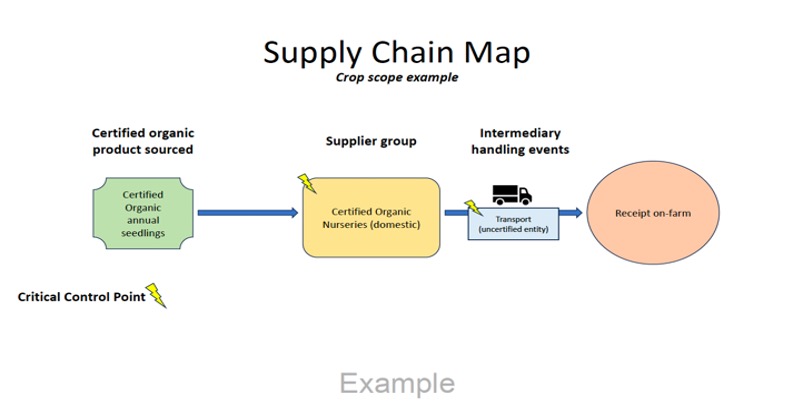
LIVESTOCK: One reference for organic animals received and another reference to domestic organic feed suppliers. If applicable, a separate reference to international organic feed suppliers is needed because the risks for organic fraud are increased for all imported goods.
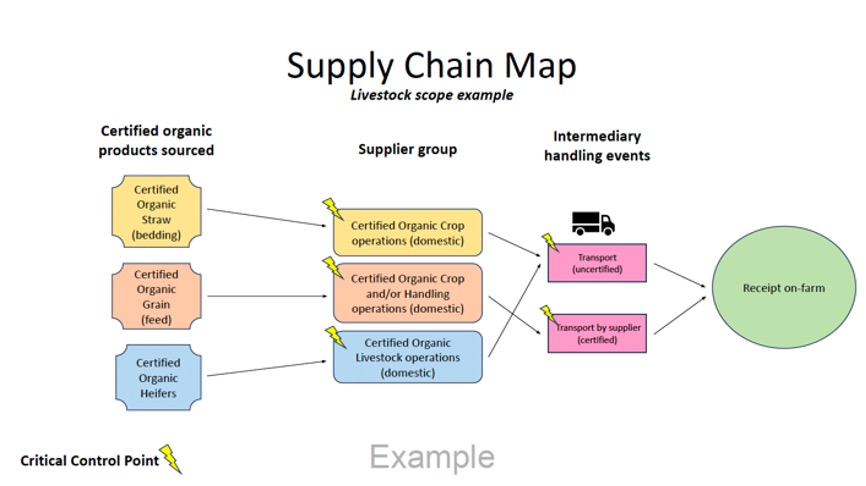
HANDLING: One reference to all domestic suppliers and another reference to international suppliers. A more complex system is broken down into smaller categories to separate out suppliers of bulk or unpackaged ingredients.
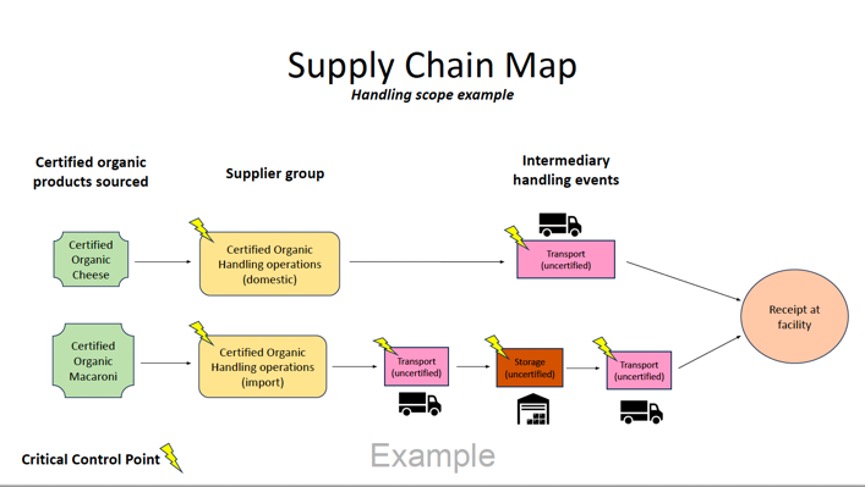
Critical Control Points (CCPs)
Critical Control Points are points in your supply chain where fraud could happen and organic integrity could be lost. You must identify and clearly mark these points on your supply chain map (e.g., with a ⚡ lightning bolt).
Common CCP examples:
- Suppliers – Always verify that your supplier is currently certified and that the exact product you\’re buying is listed on their certificate.
Example: A supplier certified for raw apples may not be certified to sell dehydrated apples. - Transport and storage – Includes trucking, rail transport, brokers (even if they don’t handle the product), or storage before you receive it.
3. Vulnerability Assessment
A vulnerability assessment helps identify fraud risks at each CCP and determine how to reduce them. Your OFPP must include a table outlining:
- Risks at each CCP
- Strategies to prevent or reduce those risks
- How and how often you monitor those strategies
Factors to consider when assessing risk:
- Strength of your relationship with the supplier
- Supplier’s certification status
- Domestic vs. international sourcing
- Whether the supplier handles both organic and non-organic goods
- Availability and market demand of the ingredient
⚠️ Higher-risk CCPs require stronger prevention strategies and more frequent monitoring.
Note: Every operation’s vulnerability assessment will look different — it depends on your supply chain and the risks you identify.
Vulnerability Assessment Examples
Example 1:
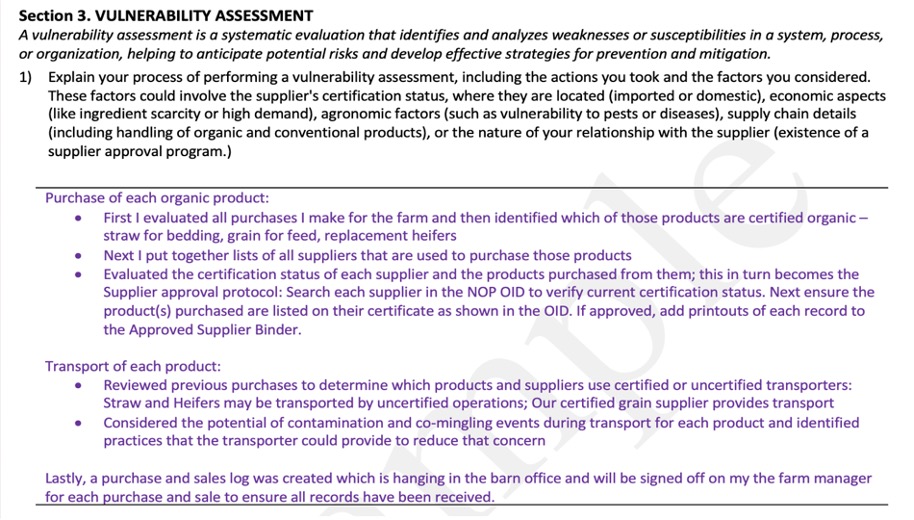
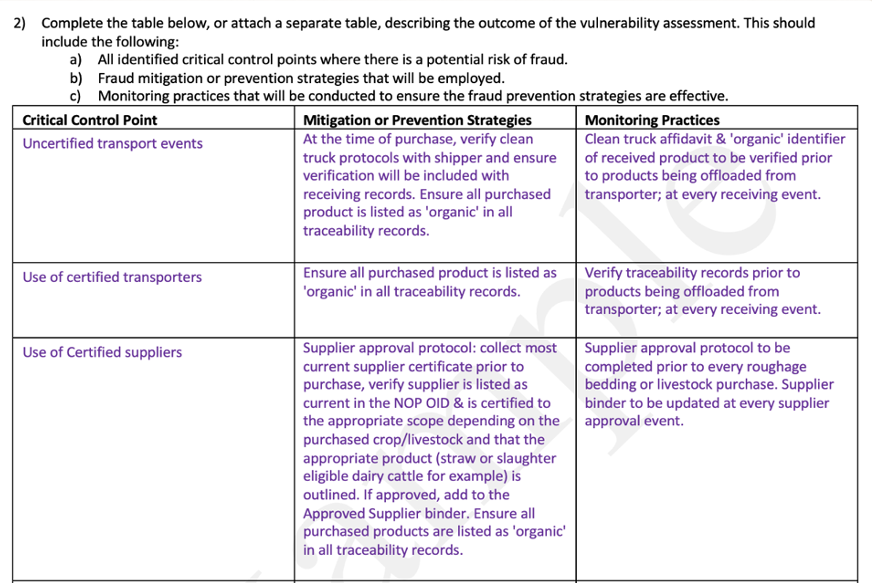
Example 2:
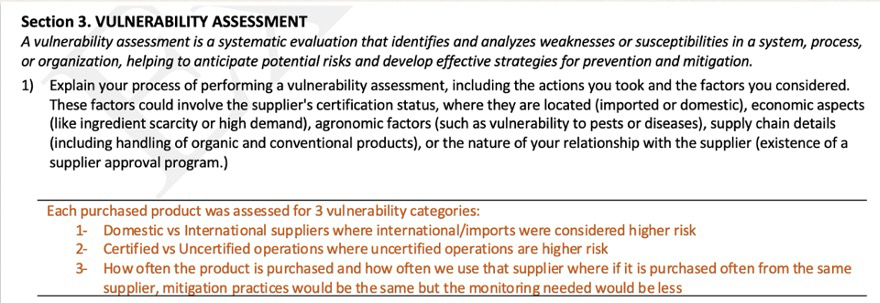
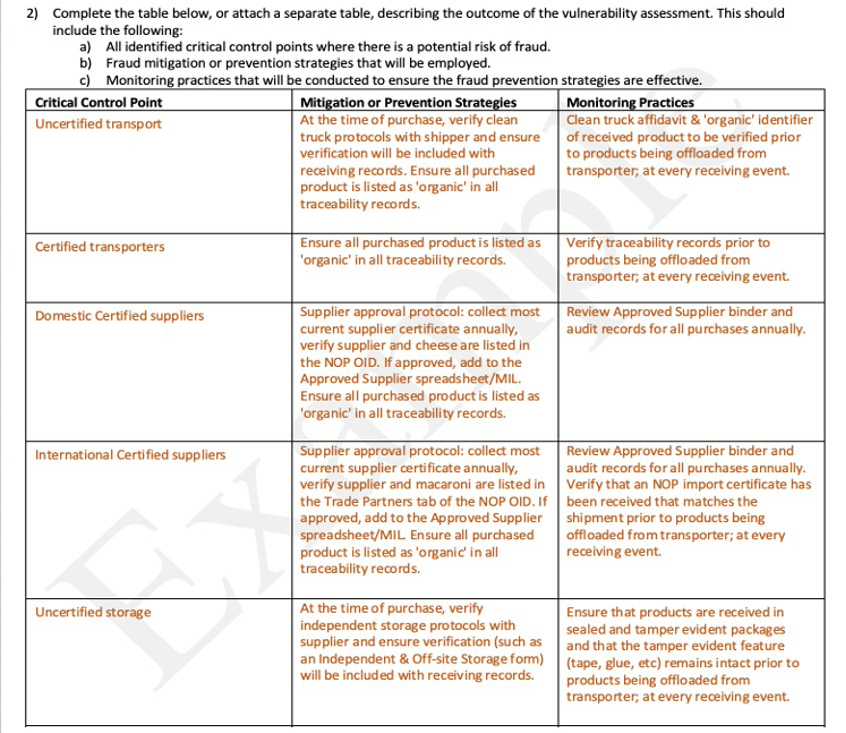
4. Training & Reporting
Your plan must explain:
- How you train employees on the OFPP
- Ongoing training methods as updates occur
- How fraud is reported to OTCO or the NOP
Report suspected fraud to the NOP:
- NOP Online Complaint Portal
- Email: NOPCompliance@usda.gov
- Phone: 202-720-3252
- Mail: NOP Compliance and Enforcement Branch,
- Agricultural Marketing Service
United States Department of Agriculture
1400 Independence Avenue, S.W.
Mail Stop 0268, Room 2642-S
Washington, D.C. 20250-026USDA
- Agricultural Marketing Service
5. Monitoring
Outline how your plan is evaluated and kept up to date, including:
- Frequency of evaluations
- How effectiveness is measured
- Procedures for updating your OFPP and submitting changes to OTCO
Additional Resources
- SOE Final Rule Overview – USDA AMS
- USDA Organic Complaint webpage
- NOP Organic Integrity Database
- OTA Organic Fraud Prevention Guide
- Federal Register Preamble for SOE Rule
Need Help?
📞 New Applicants: (541) 201-8042
✉️ getcertified@tilth.org
📞 Existing Clients: Contact your OTCO client service team:
| Team | Phone | |
|---|---|---|
| Red | 541-241-8037 | red@tilth.org |
| Orange | 541-226-3176 | orange@tilth.org |
| Yellow | 541-279-2232 | yellow@tilth.org |
| Green | 541-304-2302 | green@tilth.org |
| Blue | 541-279-2676 | blue@tilth.org |
| Indigo | 541-291-4919 | indigo@tilth.org |
Here at Oregon Tilth, we’d like to extend a heartfelt appreciation to everyone in the global organic community – you are the driving force behind this change and growth. Everyone’s dedication to organic integrity is what propels our mission forward. Let’s continue to learn, to share, and to inspire.
Together, we can build a more sustainable food future.
